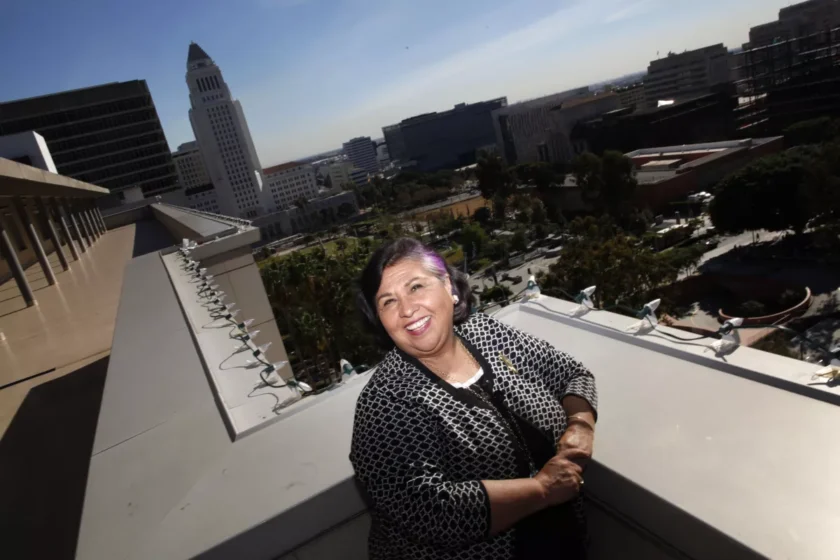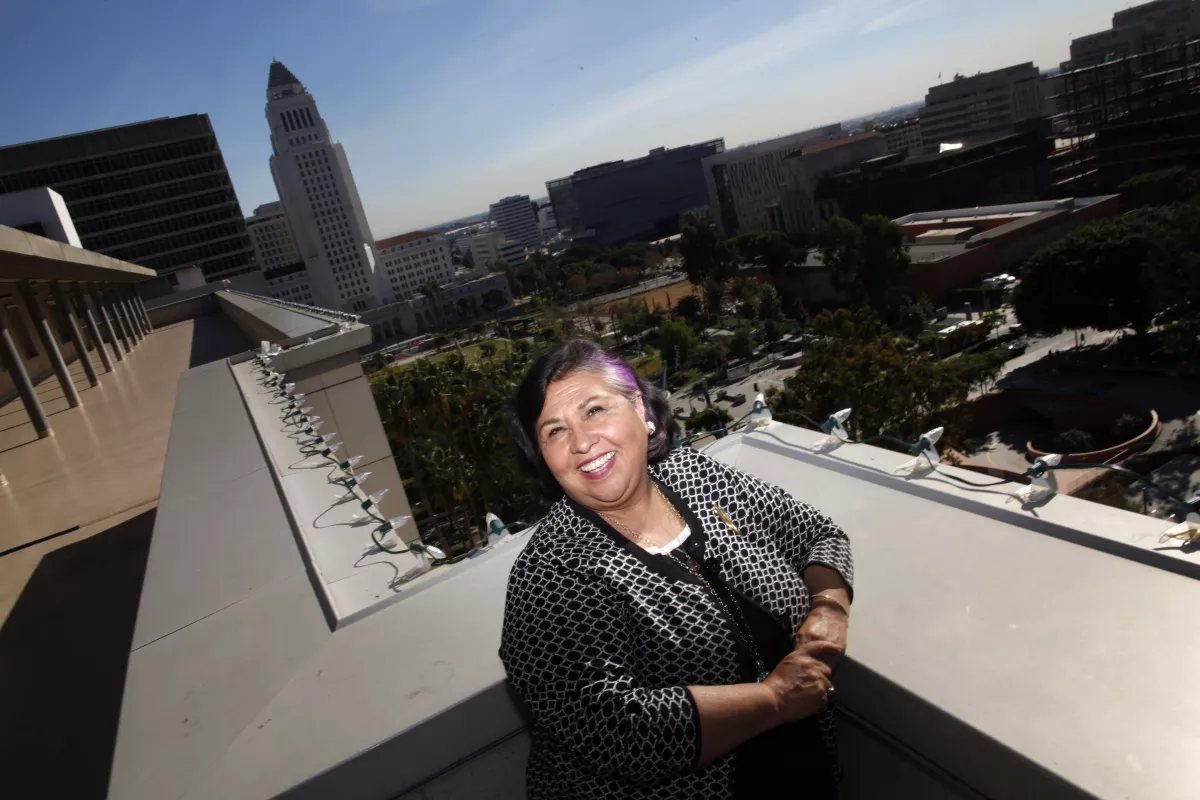Gloria Molina, a Trailblazing Chicana in L.A. Politics, Passes Away
Gloria Molina, a proud Chicana and daughter of working-class parents, who reshaped Los Angeles politics, passed away at the age of 74 on Sunday night after a long battle with cancer, as confirmed on her official Facebook page. Molina died at her home in Mount Washington, surrounded by her loved ones.
Molina’s illustrious political career was marked by a string of firsts, inspiring women and Latinos to enter politics. She was the first Latina to serve in the California State Assembly, the Los Angeles City Council, and the L.A. County Board of Supervisors.

Throughout her rise, Molina navigated the corridors of power in L.A. with a unique blend of outsider skepticism and insider savvy. She was a grassroots populist who drew inspiration from both the Chicano and feminist movements, and the immigrant experiences of her parents, and fought for various causes.
During her 32-year political career, Molina was not afraid to stand up to powerful politicians who attempted to dump prisons and polluters in her Eastside district in Sacramento. As a member of the City Council, she was instrumental in the drive to construct affordable housing and mobilized street sweepers to clean neighborhoods that had been neglected for years by local officials. As a supervisor, she successfully fought against pension spikes and work perks for public employees, such as private chefs and personal drivers for supervisors.
According to Fernando Guerra, the director of Loyola Marymount’s Center for the Study of Los Angeles, Molina was the embodiment of the convergence of communities – women, Mexican Americans, and the Eastside – that had long been overlooked by Los Angeles’ power brokers, who were often white and male.
Despite being a part of the system, Molina never took its word for granted, and she relished any chance to confront her critics, of which there were many.
Molina wasn’t afraid to speak her mind, even when faced with bigotry and ridicule. In Sacramento, she battled against politicians who wanted to dump prisons and polluters in her district. On the City Council, she championed building affordable housing and getting streets swept in neglected neighborhoods. As a supervisor, she pushed back against pension spikes and work perks, despite facing opposition from Eastside politicos she had helped elect.
Molina’s outspoken style made her a living legend among voters and volunteers, even if it made some colleagues uncomfortable. Yet, many political and cultural heavyweights paid their respects after she announced her cancer diagnosis in March. While some may have found her abrasive, they also knew that she held up a mirror to themselves and to society.
In the last weeks of her life, Molina received several public and private honors that reflected the breadth of her career. Metro named a Gold Line station in East L.A. after her, and the Board of Supervisors renamed Grand Park in downtown L.A. to honor her contribution to its creation. Casa 0101 renamed its performance space the Gloria Molina Auditorium, and the L.A. County Fair introduced the Gloria Molina Quilting Award to recognize her skill and dedication to the craft.
Gloria Molina was born in 1948 to Concepción and Leonardo Molina. Her parents were a homemaker and construction worker respectively and had roots in Casa Grandes in Chihuahua, Mexico. The family lived in a small house behind a mercadito owned by Gloria’s godmother in Barrio Simons, which was a neighborhood adjacent to one of the largest brickyards in the world, now located in Montebello. Despite their financial struggles, Gloria was never made to feel poor, and her parents encouraged her to pursue her aspirations.
As the eldest of 10 children, Gloria took on numerous responsibilities from a young age, including translating for her Spanish-speaking father, helping her mother care for her siblings, and advocating for her younger siblings’ needs. One particular incident showcased her early propensity for advocacy. While shopping for clothes at Lerner department store, Gloria asked the store manager why they were being ignored, and he made a derogatory comment about her Mexican mother’s large family. Gloria informed her father, who was enraged and never allowed the family to shop there again.
When Gloria was in third grade, the family moved to Pico Rivera, joining thousands of other Mexican Americans who relocated to LA’s middle-class suburbs from the Eastside. However, when her father suffered a work injury in 1967, Gloria became the family’s primary breadwinner, working as a legal secretary while studying fashion design at Rio Hondo College and East LA College. She became involved in Chicano activism at East LA College and volunteered at Maravilla housing projects, where she witnessed the squalid living conditions of young women and their children. She also participated in the Chicano Moratorium in 1970, a protest against the Vietnam War in East LA, which ended tragically with the deaths of three people, including LA Times columnist Ruben Salazar, and the violent beating of attendees by sheriff’s deputies.
A 1954 film called “Salt of the Earth” that showcased Latinas replacing their incarcerated husbands on a picket line during a New Mexico zinc strike had a profound impact on Molina’s political views. It resonated with her as she was already dissatisfied with the sexism in the Chicano movement, which claimed to be progressive.
Molina, however, assisted on the political campaigns of Richard Alatorre and Art Torres, two Eastsiders who later became Assembly members, and eventually became Torres’ administrative assistant, the first Latina to hold such a position in the California Legislature. She also became the chair of the Comisión Femenil Mexicana Nacional, a statewide grassroots network, and helped lead a class-action lawsuit against L.A. County-USC Medical Center for coercing Mexican American women into sterilization.
Despite a federal judge ultimately ruling against the plaintiffs in the sterilization case, Molina continued to campaign for Chicana candidates across California, serving as a fundraiser and campaign manager. She also acted as a bridge between the separated sisterhoods of the Westside, South L.A., and the Eastside, earning respect and admiration from many, including Rep. Maxine Waters, who viewed Molina as a leader and relied on her support during her successful 1976 Assembly race.
During her time with the Carter administration, Molina led Latino outreach in California and worked in the Office of Presidential Personnel to diversify thousands of commission seats. However, homesick for Los Angeles and disappointed by the lack of Latino representation in Washington, D.C., she took a job with the Department of Health and Human Services in San Francisco before becoming the deputy for Assembly Speaker Willie Brown in L.A.
In 1982, Molina was suggested by her former boss Torres to take his Assembly district seat when he decided to run for the state Senate. However, Eastside leaders, including Alatorre, had already chosen Molina’s childhood friend Richard Polanco as their preferred candidate. Despite feeling betrayed, Molina announced her candidacy and mobilized the network of women she had supported over the years to become volunteers, who phone-banked, walked precincts, and sent out mailers. These women made up an estimated 70% of her contributions, including a $5,000 check from Waters, which was Molina’s first significant donation.
In the primary, Molina defeated Polanco by a narrow margin of 52% to 48%, and in the general election, she easily defeated her Republican opponent. Her election night party was held at Stevens Steakhouse in Commerce, where the Eastside machine had met months earlier to settle on Polanco as their candidate. Despite opposition from Eastside leaders, Molina went on to win several more elections using the same template for victory.
Also Read, Doyle Brunson Passed Away at the age of 89
Follow us or bookmark us for Latest Pictures Entertainment News Technology Celeb Bio box office collection report celebrities trailers and promos
Join us on Facebook
Join us on Twitter
